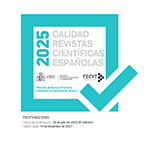Production and programming of television comedies in Franco’s regime: Jaime de Armiñán and the first traditional comedies
Abstract
Comic series or TV comedies are one of the most popular genres in Spain had its origin during Franco’s regime. In this context, this article aims to provide a historical review and highlight the main features of production and programming of the major comedies produced and programmed by TVE between 1956 and 1975, while the memory of one of its greatest exponents is rescued: Jaime de Armiñán, who is considered one the first TV scriptwriters in Spain. This creator is a pioneer in setting this TV profession in Spain. Author of numerous plays, including television fiction, many of his comedies shaped the basis of the current TV sitcom in Spain. Having their main goal to entertain the viewers while educating them, the TV comedy of this time presented recognizable or stereotypical characters; the twisting of language to comic ends: plays on words, double entendres, etc.; and plots and stories tending towards melodrama and sentimentalism. Some of the most remarkabl titles by Armiñán were Galería de maridos (19591960), Galería de esposas (1960), Mujeres Solas (1960) o Chicas en la ciudad (1961).Downloads
Article download
License
In order to support the global exchange of knowledge, the journal Estudios sobre el Mensaje Periodístico is allowing unrestricted access to its content as from its publication in this electronic edition, and as such it is an open-access journal. The originals published in this journal are the property of the Complutense University of Madrid and any reproduction thereof in full or in part must cite the source. All content is distributed under a Creative Commons Attribution 4.0 use and distribution licence (CC BY 4.0). This circumstance must be expressly stated in these terms where necessary. You can view the summary and the complete legal text of the licence.










